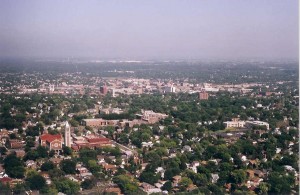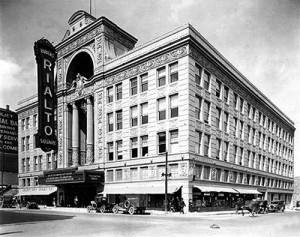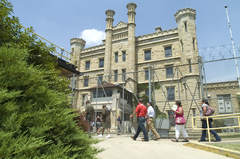The Saturday before Earth Day, Jesse Jackson, Jr. and a contingent of political supporters rode down to the farmlands of eastern Will County to spade up a little dirt in a pious promotion of the ill-fated Great Imaginary (aka Peotone) Airport.
Given that the project has neither FAA approval nor the support of a single major airline, Jackson’s well-publicized pontifications were presumptuous — but not pointless, for they re-energized the hitherto dispirited airport opposition movement around Peotone, Beecher, and Monee, the small towns most affected by this ongoing fiasco.
I drove out northeast of Peotone that Saturday in hopes of attending Jackson’s media stunt and the planned counter-demonstration by the longstanding grassroots organization Shut This Airport Nightmare Down (STAND). Turned out I was too late and missed them both.
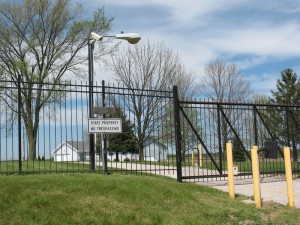
But after heading past the Illinois Department of Transportation’s heavily-fenced airport headquarters on Eagle Lake Road west of State Route 50 — a place derisively nicknamed “The Compound” by locals for its quasi-military installation appearance — I ran into some folks who helpfully filled me in on the day’s proceedings.
Robert Ogalla, a farmer whose wife Judy is the vice-president of STAND, grows corn, soybeans, and wheat on their picturesque farm along County Road 10. Back in 2003, the Ogallas received a commendation from the Will-South Cook Soil and Water Conservation District for their exemplary efforts to reduce soil erosion and polluting runoff on their property.

Mr. Ogalla described the lively scene that had transpired earlier that day at the Compound, where over 400 STAND supporters had gathered peacefully to protest Jackson’s groundbreaking event and voice their many objections to the state’s relentless land-acquisition plans.
“This is some of the best farmland in the world,” Ogalla told me, gesturing toward his well-tended fields. “Those trees you see there on the horizon were planted many years ago as part of Illinois’ Conservation Reserve Program by my 101-year-old neighbor.”
He paused to let that sink in, then continued, “All this will be gone if the airport gets built. The irony of it is that no airline even wants it.”

Another STAND member, Virginia Hamann of Peotone, drives a bus for the Peotone School District and helps her husband run a dairy farm located across the road from the proposed airport. “What gets me is the terrible waste of money all this is,” she said.
How wasteful, you might ask? Many of those fertile fields I admired that day already have been purchased by the state — to be precise, 2,471 acres at the cost of 34,014,383 taxpayer dollars — all without FAA approval of the project, naturally. Now, with willing sellers scarce and land values low, IDOT has condemned some local farmers’ property (like that of Vivian and Willis Bramstaedt) to close the deal on the remaining acreage within the Great Imaginary Airport’s nine-square-mile footprint.
When I asked Ogalla and Hamann how their neighbors were feeling about the airport issue these days, they estimated that a strong majority, perhaps 70-80 percent, now backed STAND’s opposition to the project.
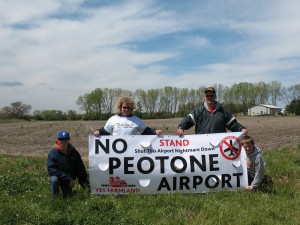
So here’s your silver lining. After several years of community demoralization in the face of a seemingly-unstoppable government juggernaut, the awakening provided by Jesse Jackson, Jr.’s grandstanding gambit has re-ignited grassroots opposition to one of the most foolhardy endeavors in Illinois history. Or so I can only hope.
A version of this article was published as my monthly op-ed column in the 3 May 2012 edition of the Joliet Herald-News. For more information from IDOT’s perspective, consult the official South Suburban Airport website. For deeper news and critical analysis, see the commentary and news reports on this blog as well as by WBEZ Chicago Public Radio and the Chicago Tribune for recent coverage of the political gamesmanship surrounding the Great Imaginary / Peotone / South Suburban / Abraham Lincoln National Airport.
Come to think of it, I wouldn’t mind building an airport, too — but just a small one for balsa wood planes in my backyard in Joliet. No eminent domain proceedings by IDOT will be necessary in its construction.


